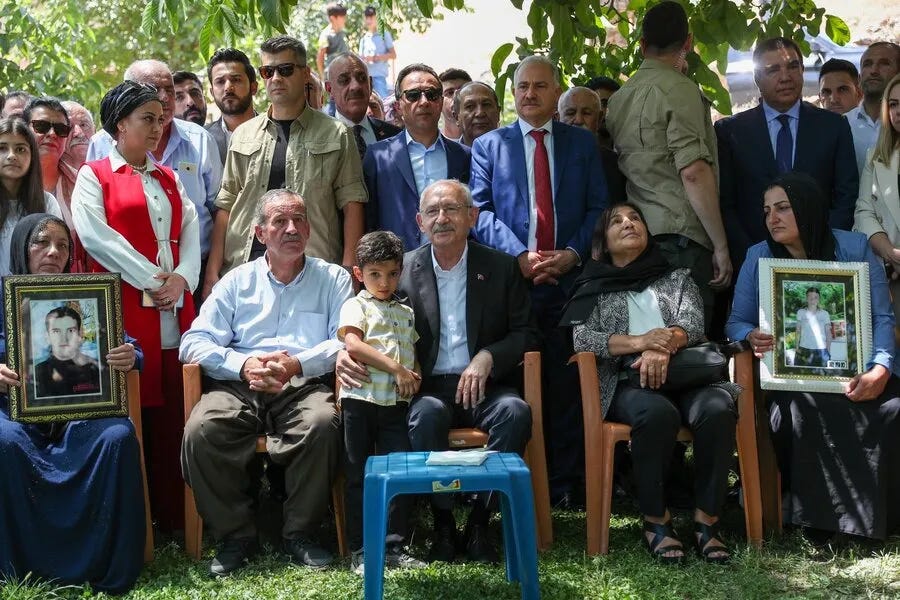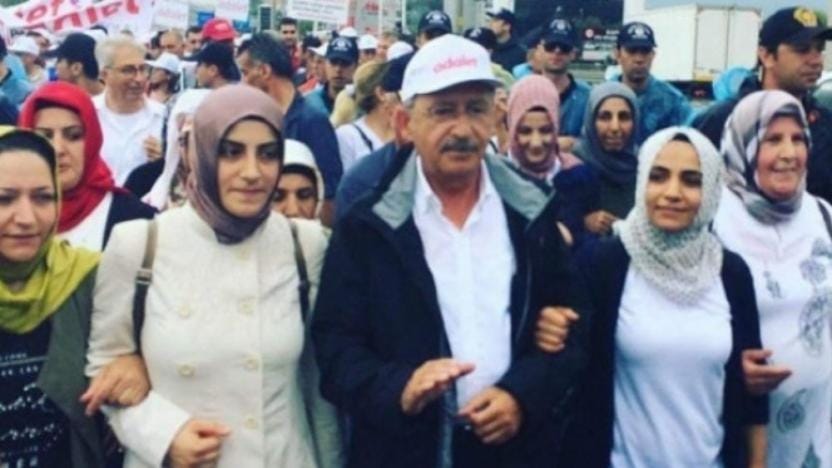Words of Transition: helalleşme vs. hesaplaşma
The concepts behind Turkey's opposition politics

Kartal İmam Hatip is a religious high school in Istanbul with very deep pockets. Its students come from the highest layers of New Turkey’s elite and later take places at the commanding heights of the country’s economy.
So it was a surprise when a group of students and recent graduates came together to write a letter of support to opposition leader Kemal Kılıçdaroğlu. The letter is open to other graduates as well. Part of it reads as follows:
We accept your invitation to helalleşme, as it is obligatory in our faith to shake the outstretched hand. We ask God to make you the 13th President of our country.
What does that word mean? If a news agency was running this story, they’d go with a translation like “to make amends,” which is perfectly fine.
But it’s no fun. This word is at the very heart of the opposition’s political strategy, so let’s dig into the detail here.
First, some etymology. Hallal in ancient Hebrew (הָלַל) apparently means “to praise, boast, be boastful.” The Arabic halāl refers to things that are religiously permitted, like the “حلال” printed on your food packaging, which means that it’s good for Muslims to eat. It’s the counter to harām, things that aren’t permitted.
When a Muslim goes against the rules without there being a direct victim, such as skipping prayers, or drinking alcohol, it’s an offense against God. If the person repents, God may forgive him, and the sin will be wiped from that person’s transcendental ledger. If, however, the person sins against someone else, such as spreading lies about them, stealing from them or hurting them, God cannot wipe that sin from that person’s ledger. Only the victim in question can do that. (I think some Christian denominations have this as well, but perhaps it’s not quite as much part of daily speech as it is in Islam.)
The way the guilty party asks the victim of the sin for forgiveness is by asking for helallik, or in its full phrase “hakkını helal etmek,” literally, “to declare one’s share helal.” The phrase implies that one has taken a share of the metaphysical belongings of another person (“hak”), that this share cannot be returned, so for the offender to balance his ledger, the offended party must sanction the transaction. The offended party can then say “helal olsun” meaning “may it be helal,” completing an “exchange of helals” (helalleşme).
There are some very common uses of this concept. Say you’ve taken a cab in Istanbul, it costs 24 lira, you hand the cabbie 25 lira, but he doesn’t have change. Traffic is piling up behind you. Your cabby will probably say something like “I don’t have change. Declare your share helal.” He is saying that his share ('“hak”) of the money is 24 lira, but circumstance dictates that he take 25 lira. He wants you to formally sanction his possession of that last lira. (Tips are uncommon in Turkish cab rides. Also, this transaction clearly takes place ten years ago, when cabbies actually provided services in Istanbul and the lira was actually a serious store of value.)
Let’s take a more serious case. You and your business partner usually split shares from sales 50/50. You now learn that he has split it 70/30 on the deal you did last week. You confront him about it, he apologizes, explaining that he has done it because his little daughter is sick and he has to pay enormous medical bills. He says he can’t pay you back, he doesn’t know if he will be in the near future either. He finishes his apology by saying “hakkını helal et,” which means he wants you to sanction that extra 20% he took.
Excessive helallik requests can be petty or boorish (see above), but when done right, a helallik exchange can be profound. A soldier being deployed is going to ask for helallik from the people around him because he may never see them again, and wants to balance his ledger with them. There’s an acknowledgement there, not only of having been wrong, but openness to the possibility of having infringed on others’ rights beyond one’s understanding. If, say, that departing soldier turns to his mother and asks for helallik, as would be usual, he is acknowledging that he understands that he is in the red, and that only his mother has a full account of his transgressions against her. He owes a debt he can never fully repay, and is appealing to his mother’s love to wipe the ledger. Somehow, bringing up the ledger can highlight how human relations of any real worth must always go beyond such accounting.
Now let’s get back to politics. In 2021, as the world was gradually coming out of the pandemic, Kılıçdaroğlu released a video on Twitter. It is remembered as the “helalleşme” speech:

The excerpt in his tweet reads:
In my lifetime, I have seen hate as well as love in our country. I now want love to win over. Our country needs healing, it needs helalleşme. Helalleşmek does not change the past, but it does save the future. Our party has also made mistakes in the past; I have decided to embark on a journey of helalleşme…
I will start meeting with communities, individuals, representatives of different lifestyles that we have offended and intimidated in the past. I am embarking on a journey of exchanging helals in order to close the wounds of the past.
He was taking stock. The CHP is the founding party of the Republic, and its history hasn’t exactly been a model of democratic conduct in the past. In a country so used to denying its historical transgressions, Kılıçdaroğlu’s outreach was unusual. He wanted to reach out to people and acknowledge that his party had made mistakes, that it had infringed on their rights in ways that only they could forgive.
“Hellalleşme” is at the core of Kılıçdaroğlu’s political project. Before him, the party was dominated by orthodox Kemalism, known for its modernist, and above all secularist outlook. Kılıçdaroğlu came to realize that the prohibitive attitude towards religion - especially the headscarf ban - looked ridiculous in the 2000s (see “post-Kemalism” for the wider academic debate on this). It was difficult for him to reform the party in this direction, but the area where his project is most visible is the choice of candidates.
In the 2014 presidential election, Kılıçdaroğlu (together with Devlet Bahçeli of the MHP) chose Ekmeleddin İhsanoğlu, an academic who had served as the head of the Organization of Islamic Cooperation (OIC). In 2018, he pushed hard for AK Party founder and former president Abdullah Gül to be the united opposition candidate, but could not get Meral Akşener to agree. Kılıçdaroğlu ended up nominating Muharrem İnce, who also tried to appeal to conservative voters.

In the 2019 regional elections, Kılıçdaroğlu’s strategy paid off for the first time. He nominated right-wing candidates in Ankara and Istanbul, and both made a point of going to mosques and catering to the conservative electorate in their cities. And it worked. Since 2019, the CHP governs not just Ankara and Istanbul, but most major metropolitan areas in the country.
Watch İmamoğlu move through a crowd, for example, and you’ll see that he doesn’t really spend too much time with the secular-looking types. He’ll mostly stop to talk to headscarved women, especially if they’re older. He’ll tell them about his mother in Trabzon, take selfies with them, and ask them to call his people if they need anything.
This kind of identity politics, of course, couldn’t have moved the needle on its own. If the economy was fine, employment was high, the earthquake hadn’t been as deadly, then conservatives probably wouldn’t have cared about the CHP’s “helalleşme” approach. As things are, some Erdoğan voters look ready to shift, and the CHP looks eager to receive them. The party is turning itself into a big tent where the pan-Turkic nationalists of İYİ Party can coexist with the left-Kurdish HDP, with small center-right parties mingling in between.
It’s be wrong to see helalleşme merely as an adjustment to conservative voters though. Take a look at this bit from a 2022 speech by Kılıçdaroğlu:
To exchange helals [a common phrasing] is to face each other, it is to be able to reconcile, it it about moving on. We will do this with communities that have [open] wounds … We have to exchange helals with the victims of February 28, and we will. We will close the wounds inflicted by February 28th and exchange helals. Of course, we will exchange helals with our veiled girls who were forced into persuasion rooms … We will echange halals with Roboski, we will exchange helals with the victims of Sivas and Kahramanmaraş. We will exchange helals with the prisoners of Diyarbakır prison. We will exchange helals with our soldiers and their families who were dragged through the courts. We will exchange helals with Ahmet Kaya, and the families of the young people they killed by calling them a leftist and ülkücü.
I won’t go through all of those references (see wiki links). What’s interesting here though, is that Kılıçdaroğlu isn’t just listing the transgressions of the CHP and the Kemalist state, but all of the state’s transgressions, including in the AK Party era. Why ask for helallik for the 2011 Roboski massacre of Kurdish youth? Or the 1993 Sivas massacre of mostly Aveli intellectuals? Isn’t Kılıçdaroğlu himself Alevi (and of Kurdish origin)? Why should he be taking responsibility for those crimes?
I think what Kılıçdaroğlu is saying here is that the Erdoğan regime exists on the back of those crimes. It is has also become increasingly clear in recent years that it has no interest in reaching out to the victims and connecting to them. As I’ve argued elsewhere, the Erdoğan palace simply assumes that a big chunk of the country are their enemies, and that they, as the state, will have to grind them down over time.
Kılıçdaroğlu is saying that under his presidency, the state would once again reach out to these communities, and his acknowledgment of his own party’s transgressions against the conservatives presumably makes this claim more credible.
The opposition’s message to the government itself, however, is a different h-word: hesaplaşma, literally “a settling of scores.” In the political context, the word is often used to describe a political clash that comes after a long period of tension.
As I’ve cover in a previous post, few in the opposition think of the presidential palace as a normal government in a democratic country. Growing parts of it think of it as a regime that has taken over the state in serial violation of the constitutional order. (The AK Party itself has argued that it is an exceptional entity, but more on that perhaps in a future post). Either way, the proponents of hesaplaşma want the AK Party to pay for its actions of the past 20 years. Their most vocal advocate is probably Turkish Workers’ Party MP Ahmet Şık.
In this program last year, he said:
We are not going to leave the opposition to the AKP and MHP. They are going to be in a dire state anyways. We are talking about a structure that’s going to be tried for being a criminal organization. Those who aren’t implicated in crimes and are clean should remain in parliament, but the AKP will be shut down because of this! Look - the AKP won’t be treated as a political party when this era is over, the AKP will be shut down because it is a criminal organization - they’ll call it a criminal organization pretending to be a political party.
Şık has tweeted out a “hesaplaşma list” of crimes the AK Party must be held responsible for, ending on the note
In a nutshell, [this is] all the lawlessness that mafiaizes the state and stateizes the mafia. You can add the ones I can't think of, so that those who have no intention of settling scores or those who will give up on settling scores can understand what/who they will be accomplices to.
Government of course, is eager to jump on things like this. They label it revanchist, arguing that the opposition’s talk of helalleşme is an act, that they are actually after revenge. Erdoğan himself responded to Şık, saying “he is a terrorist, he should worry how to save himself.” Coming from the head of state who has a penchant for political prisoners, that’s a pretty hefty threat. Şık responded by writing that once the Erdoğan era was over, an impartial judiciary would decide who’s a terrorist and who isn’t.
TİP continues the hesaplaşma line. Its chairman Erkan Baş gave a fiery speech over the weekend in İzmir, promising to bring AK Party cronies to justice.
Kılıçdaroğlu himself has said that he would want to see criminals of the AK Party era prosecuted. “We are going to exchange helals with the people, but we will settle scores with the gang of five” he said, referring to the notorious construction magnates known for their symbiotic relationship with the presidential palace. Kılıçdaroğlu has also threatened the bureaucracy against actions that might unduly disadvantage the opposition. The “helalleşme-hesaplaşma balance,” as it has been called, appears to have worked out on the rhetorical level so far. It will be far more difficult to get it right if Kılıçdaroğlu actually ascends to the presidency.
Announcement: as you might be aware, Twitter has made it very difficult to share Substack links on the platform. You can still share this post, for example, but the algorithm will suppress its circulation. Twitter is also not allowing us to embed tweets in Substack posts any more.
Elon Musk seems to have done this because Substack recently launched a “Notes” feature that emulates Twitter in some ways. So far, Notes looks like a clean version of Twitter, where mostly writers and some dedicated readers hang out and share links. My feed right now is a lot of historians, area specialists and philosophers sharing notes from their book research. Very Anglo-American for now, but hopefully that will change.
I’m still going to drop by Twitter every now and then, but am planning on spending more time on Notes. Drop by sometime! Write some comments! You can also always hit “reply” on these emails.
Also, if you aren’t yet a paid subscriber, please consider becoming one. You’ll get my semi-weekly email on things I’ve been reading and watching lately. You’ll also be helping me carve out more time to write these posts!




